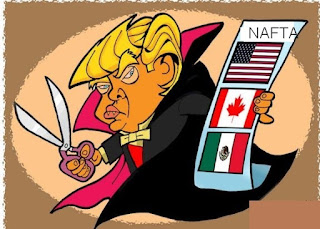NAFTA-itis
NAFTA
The question on the mind of every CEO, union leader, politician, investor, auto worker and trade lawyer—indeed, anyone with a stake in NAFTA’s survival—is what next?
For more than 20 years, NAFTA has been a source of economic growth for the world’s largest trading bloc. Most economists view the free trade deal as a net positive for the three nations. In a speech in August, Foreign Affairs Minister Chrystia Freeland said Canada’s economy is 2.5 per cent larger every year than it would be without NAFTA: “It is as if Canada has been receiving a $20-billion cheque each year since NAFTA was ratified.”
It’s safe to say that companies with the heaviest exposure to the U.S. will be hit hardest and fastest. “Canadian exporters would really get hammered in the capital markets,” Lee says. “When markets are uncertain, you err on the side of caution. What would the market do to those companies? They wouldn’t know how much of their sales would be going down. I can’t predict a number, but it would have very profound negative consequences for those companies
NAFTA’s demise would also instantly send shock waves through currency markets, putting the loonie into a tailspin. That should provide a cushion to exporters, since their products will be cheaper for American consumers to buy. But whether the currency discount would be enough to make up for any higher tariffs in the aftermath of NAFTA is a key question. The flip side of a weaker Canadian currency is that goods in Canada would cost more. For companies, that means forking out more to import equipment, tools and services to run their businesses. All these uncertainties would likely leave businesses wary of adding new staff, and may even spur some to cut costs, threatening to send Canada’s bustling job market into reverse.
The reason there’s a six-month notice period to withdraw from trade deals stems from a provision in the U.S. Trade Act of 1974. “What it doesn’t say,” says Johnson, “is who can give that notice.”
Few people working in trade law today have bothered to read the 1989 Canada-U.S. Free Trade Agreement (CUSFTA). Why would they? The deal was suspended when NAFTA took effect in 1994. But the paperwork has been dusted off in recent months as policy-makers debate whether this old deal—despite its imperfections—might be awakened from its quarter-century coma should Trump pull America out of NAFTA.
Some maintain the original deal will automatically take hold, meaning Canada and the U.S. would still enjoy tariff-free trade across many industries even without NAFTA.
The president has largely directed his ire toward Mexico for what he perceives as the unfairness of NAFTA. But that doesn’t mean he’ll be in a hurry to restore Canada’s free trade safety blanket. After all, doing so would undercut the U.S.’s negotiating position.
It’s entirely possible, then, that Canada and the U.S. could be without any free-trade deal six months from the day Trump gives the word.
The absence of a free-trade deal between the U.S. and Canada does not mean there would be no trade between the two countries. The U.S. would remain Canada’s largest trading partner. The question is just how much that cross-border trade ($673 billion in 2016) will drop.
Faced with uncertainty, economists are trying to find reasons to remain optimistic. “We don’t have free trade deals with China and they’re still our second-largest trading partner,” says Jacqueline Palladini, a senior economist with the Conference Board of Canada.
Things would suddenly get more expensive for Canadians. The free flow of goods across North American borders has played a big part in keeping consumer prices in check. The mix of higher tariffs, a falling loonie and the inevitable “buy American” and retaliatory “buy Canadian” protectionist policies that would follow NAFTA’s collapse would all serve to push up prices for consumers.
“Any prime minister of Canada—doesn’t matter what political party—has two things in their job description: don’t lose Quebec on your watch and don’t mess up the relationship with the United States,” says Lee, the Carleton University professor. “If you mess up either one of those two things, you lose your job.”




Comments
Post a Comment